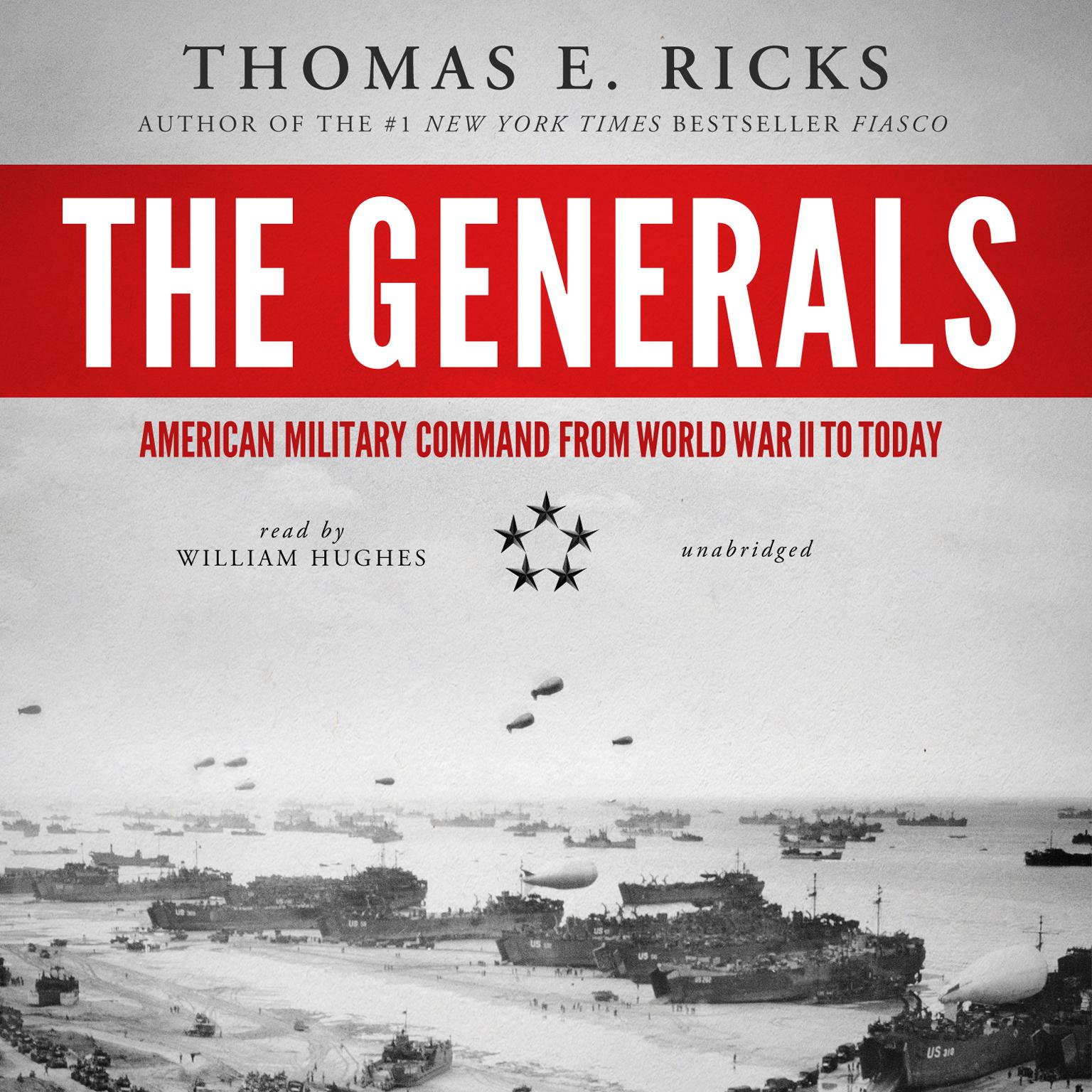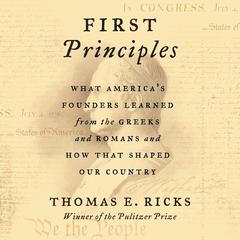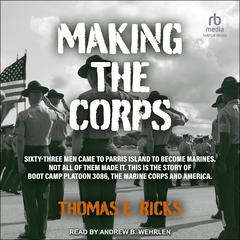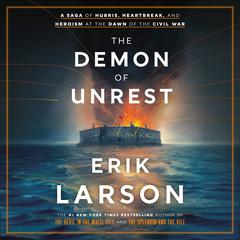 Play Audiobook Sample
Play Audiobook Sample
The Generals: American Military Command from World War II to Today Audiobook
 Play Audiobook Sample
Play Audiobook Sample
Quick Stats About this Audiobook
Total Audiobook Chapters:
Longest Chapter Length:
Shortest Chapter Length:
Average Chapter Length:
Audiobooks by this Author:
Publisher Description
From the #1 New York Times bestselling author of Fiasco and The Gamble comes an epic history of the decline of American military leadership from World War II to Iraq.
History has been kinder to the American generals of World War II—Marshall, Eisenhower, Patton, and Bradley—than to the generals of the wars that followed. Is this merely nostalgia? In The Generals, Thomas E. Ricks answers the question definitively: No, it is not—in no small part because of a widening gulf between performance and accountability. During the Second World War, scores of American generals were relieved of command simply for not being good enough. Today as one American colonel said bitterly during the Iraq War, "As matters stand now, a private who loses a rifle suffers far greater consequences than a general who loses a war."
In The Generals we meet great leaders and suspect ones, generals who rose to the occasion and those who failed themselves and their soldiers. Marshall and Eisenhower cast long shadows over this story, but no single figure is more inspiring than Marine General O. P. Smith, whose fighting retreat from the Chinese onslaught into Korea in the winter of 1950 snatched a kind of victory from the jaws of annihilation. But Smith's courage and genius in the face of one of the grimmest scenarios the marines have ever faced only cast the shortcomings of the people who put him there in sharper relief.
If Korea showed the first signs of a culture that neither punished mediocrity nor particularly rewarded daring, the Vietnam War saw American military leadership bottom out. The My Lai massacre is held up as the emblematic event of this dark chapter of our history.
In the wake of Vietnam, a battle for the soul of the US Army was waged with impressive success. It became a transformed institution, reinvigorated from the bottom up. But if the body was highly toned, its head still suffered from familiar problems, resulting in leadership that, from the first Iraq War through to the present, wastactically savvy but strategically obtuse—one that would win battles but would end wars badly.
Thomas E. Ricks has made a close study of America's military leaders for three decades, and in his hands this story resounds with larger meaning: the transmission of values, strategic thinking, the difference between an organization that learns and one that fails. Military history of the highest quality, The Generals is also essential reading for anyone with an interest in the difference between good leaders and bad ones.
Download and start listening now!
"This is a study of American generals since WWII by the national defense/security correspondent for the Washington Post. Ricks wrote two superb book on the Iraq War (Fiasco; The Gamble). I had expected that the book would be a series of profiles of some of the key individuals to have enjoyed senior command rank in the Army. It is much more than that. Ricks has written a thoughtful management study focused on the issues of how generals are held accountable for their performance - the extent to which they are relieved of command by their superiors. The standard here is the system established by General George Marshall immediately prior to the start of WWII, by which poor performing generals were frequently relieved of command and either reassigned to other duties or retired. Ricks links such a policy to the success of US forces in WWII and the stabilization of the US position in Korea under Ridgeway. In subsequent wars, especially Vietnam, generals were not frequently relieved, with the result that accountability within the Army suffered, as did relations between the Armed Forces and civilian control. He follows the analysis through to the Iraq Wars and the Afghan War up through the departure of General David Petraeus to the CIA.Overall, this is an excellent look at the relationship between personnel policies, leadership development, organizational culture, and the strategic performance of an organization. Ricks also considers the role of more general personnel policies regarding length of tours, reassignment, unit rotations, and the like. He is especially strong at separating the issues of organization and culture from the issues of personality that can often dominate popular discussions of military leaders and their occasional failings. Ricks also emphasizes that removals need not be totally negative and should be tied to "second chances" where possible.The author tries to do too much in spots and cover too much ground. The failures of strategy and doctrine in Vietnam, for example, go far beyond policies regarding the relief of senior officers and have been covered elsewhere. Similarly, the author's treatment of the rebuilding of the Army after Vietnam is very enlightening but goes well beyond issues of generalship. It would also have been helpful to consider why the Marshall systems is not as feasible in a context of minor and more limited wars, which is the context most likely to be seen going forward. These are minor issues, considering the great strengths of the book, which is well written and well referenced. I would highly recommend this book to anyone following current military and national security issues. Ricks is one of the very best writers on such topics (he also has a good blog). This book presents a striking example of his skills."
— Marks54 (4 out of 5 stars)
Quotes
-
“Engaging, informed…a highly entertaining book.”
— Wall Street Journal -
“[Ricks’] combination of conviction and erudition allows him to deliver an entertaining and enlightening jeremiad that should.”
— New York Times Book Review -
“Much of what Ricks mentions can be found elsewhere, but his skill at pulling it all together and his fresh insights give the narrative power.”
— Washington Post -
“Impressive…Stark, fact-based, and strongly argued.”
— Chicago Tribune -
“An impressive level of research with expert storytelling.”
— Weekly Standard -
“[A] savvy study of leadership in the US Army…an incisive, hard-hitting corrective to unthinking veneration of American military prowess.”
— Publishers Weekly (starred review) -
“Superbly researched and written.”
— Library Journal -
“[A] provocative, blistering critique of a system where accountability appears to have gone missing.”
— Kirkus Reviews -
“Insightful, well written, and thought provoking…This book justifiably calls for a return to the strict, demanding, and successful Marshall prescription for generalship. It is a reminder that the lives of soldiers are more important than the careers of officers—and that winning wars is more important than either.”
— Lieutenant General Bernard E. Trainor, USMC (Ret.); author of The Generals’ War -
“Thomas E. Ricks has written a definitive and comprehensive story of American generalship from the battlefields of World War II to the recent war in Iraq. The Generals candidly reveals their triumphs and failures, and offers a prognosis of what can be done to ensure success by our future leaders in the volatile world of the twenty-first century.”
— Carlo D’Este, author of Patton: A Genius for War -
“This is a brilliant book—deeply researched, very well-written, and outspoken. Ricks pulls no punches in naming names as he cites serious failures of leadership, even as we were winning World War II, and failures that led to serious problems in later wars. And he calls for rethinking the concept of generalship in the Army of the future.”
— William J. Perry, nineteenth US Secretary of Defense -
“The Generals rips up the definition of professionalism in which the US Army has clothed itself. Tom Ricks shows that it has lost the habit of sacking those who cannot meet the challenge of war, leaving it to presidents to do so. His devastating analysis explains much that is wrong in US civil-military relations. America’s allies, who have looked to emulate too slavishly the world’s preeminent military power, should also take heed.”
— Hew Strachan, Chichele Professor of the History of War, University of Oxford -
“Tom Ricks has written another provocative and superbly researched book that addresses a critical issue: generalship. After each period of conflict in our history, the quality and performance of our senior military leaders comes under serious scrutiny. The Generals will be a definitive and controversial work that will spark the debate, once again, regarding how we make and choose our top military leaders.”
— General Anthony C. Zinni, USMC (Ret.)
Awards
-
A Publishers Weekly Pick of the Week, October 2012
-
A 2012 Washington Post Best Book for Nonfiction
-
A New York Times bestseller
-
A 2012 Kansas City Star Top 100 Book for Nonfiction
The Generals Listener Reviews
-
" I have such respect for Thomas Ricks. Fiasco was intelligent and insightful and really blew the lid off the manipulative and sorry rationale for the Iraq war, and the disastrous way in which it was pursued. This book is an educated and smart work that offers a great deal of wisdom regarding military leadership and personality. Ricks describes generals seriatum from WWII to the present day. His persistent use of Marshall as the gold standard of military leadership somewhat constrains his exegesis, I feel, but my husband, much better read in military history than I, found it compelling. "
— Tanya, 2/8/2014 -
" A great and interesting book on the military's generals from World War II to the present. Each general in every war and every theater planned and took risks with tactics. Some were successful and some failed. This book also tells about what true leadership was and still is in the military as well. "
— Steve, 2/7/2014 -
" A book to be read by every aspiring officer of any service, an especially for all Congressional and Executive branch folks. Whilst it is compelling reading, the lessons for line officers are vital. "
— Jim, 2/6/2014 -
" Bureaucracy kills? This is a frequently chilling account of military leadership being more afraid of Congress, or hard thinking, than they are of wasting soldiers' lives. I learned more about the Korean War than I expected to (shiver) but less about Afghanistan and Iraq. "
— Kate, 2/5/2014 -
" A very good, interesting and prescriptive look at Army and Marine generalship in the past seventy years. "
— Evan, 2/4/2014 -
" A devastating review of the lack of real leadership and scrutiny of military generals since WW II. Few are unscathed and most are found wanting. The chilling message is that these are the men that are responsible for the lives of our military men and women. "
— Paul, 1/24/2014 -
" This is a brilliant examination of leadership in the Army, with a candid evaluation of individuals, as well as the system. The country, and the army, needed just such a critique. "
— Richard, 1/18/2014 -
" Am reading this currently. It is about U.S. Generals and how they have performed. Includes stories of the ones who were fired as well as the ones who progressed. Have read only four chapters so far. "
— Richard, 1/6/2014 -
" it was long and dry but very I informative. the author hit on a lot of good points. "
— Mitch, 11/29/2013 -
" While prone to excessive asides that are interesting and well written if non germane, this book shines best when it discusses generals who are unfamiliar to us. "
— Jmt, 11/29/2013 -
" Good book focusing on the Army General Officers and the history of relieving underperforming commanders. The Army hasn't done so since the Korean War and has suffered, and I can't say the AF has done any better. "
— Russ, 11/16/2013 -
" Took a lot to get through this but learned a lot, Ricks holds a lot of credibility. Timely with Petraous debacle. "
— Katherine, 10/1/2013 -
" Incredibly engaging! "
— John, 6/11/2013 -
" I just wish that everyone who has an 'opinion' about the war has read it, at least! "
— Danuta, 5/2/2013 -
" A must read if you like WWII and the military "
— Bobby, 2/15/2013 -
" If you care about the U.S. Army, if you enjoy military history, if you want to learn about leadership, read this book! It is well written, well researched, thoughtful and insightful. "
— Dave, 12/17/2012
About Thomas E. Ricks
Thomas E. Ricks, New York Times bestselling author, is an adviser on national security at the New America Foundation, where he participates in its “Future of War” project. He was previously a fellow at the Center for a New American Security and is a contributing editor of Foreign Policy magazine, for which he writes the prizewinning blog The Best Defense. A member of two Pulitzer Prize-winning teams, he covered US military activities in Somalia, Haiti, Korea, Bosnia, Kosovo, Macedonia, Kuwait, Turkey, Afghanistan, and Iraq. He is the author of several books, including The Generals, The Gamble, and the number one New York Times bestseller Fiasco, which was a finalist for the Pulitzer Prize.
About William Hughes
William Hughes is an AudioFile Earphones Award–winning narrator. A professor of political science at Southern Oregon University in Ashland, Oregon, he received his doctorate in American politics from the University of California at Davis. He has done voice-over work for radio and film and is also an accomplished jazz guitarist.






























